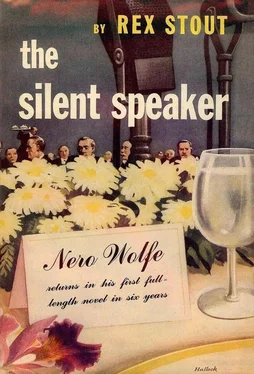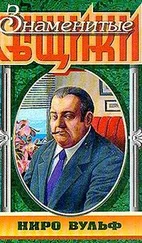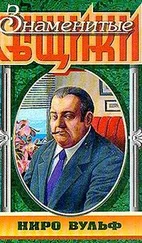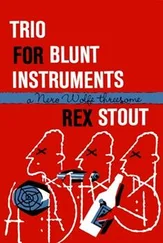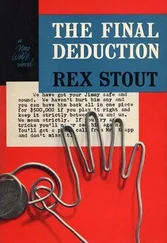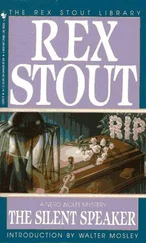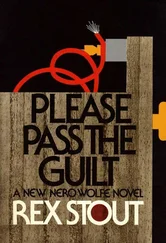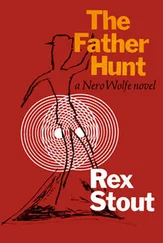“Confound it,” Wolfe said bitterly. “Probably someone peddling herrings. But we can’t afford to ignore it.” He glanced at the wall clock, which said three minutes past nine. “Find out if Mr. O’Neill is at home. Just ask him — no. Let me have him.”
The number of O’Neill’s residence, an apartment on Park Avenue was listed, and I got both it and him. Wolfe took it, and told him about the request from Adamson, the NIA lawyer, and fed him a long rigmarole about the inadvisability of written reports. O’Neill said he didn’t care a hang about reports, written or otherwise, and they parted friends.
Wolfe considered a moment. “No. We’ll let him go for tonight. You had better get him in the morning as he leaves. If we decide to keep it up we can get Orrie Cather.”
Tailing as a solo job in New York can be almost anything, depending on the circumstances. You can wear out your brain and muscles in a strenuous ten-hour stretch, keeping contact only by using all the dodges on the list and inventing some more as you go along, and then lose him by some lousy little break that nothing and no one could have prevented. Or you can lose him the first five minutes, especially if he knows you’re there. Or, also in the first five minutes, he can take to a chair somewhere, an office or a hotel room, and stay there all day, not giving a damn how bored you get.
So you never know, but what I fully expected was a long day of nothing since it was Sunday. A little after eight in the morning I sat in a taxi which, headed downtown, was parked on Park Avenue in the Seventies, fifty paces north of the entrance to the apartment house where O’Neill lived. I would have given even money that I would still be there six hours later, or even twelve, though I admitted there was a fair chance of our going to church at eleven, or to a restaurant for two o’clock dinner. I couldn’t even read the Sunday paper with any satisfaction because I had to keep my eye on the entrance. The taxi driver was my old stand-by Herb Aronson, but he had never seen O’Neill. As the time went by we discussed various kinds of matters, and he read aloud to me from the Times .
At ten o’clock we decided to get a bet down. Each of us would write on a slip of paper the time that we thought my man would stick his nose out, and the one that was furthest off would pay the other one a cent a minute for the time he missed it by. Herb was just handing me a scrap he tore from the Times for me to write my guess on when I saw Don O’Neill emerging to the sidewalk.
I told Herb, “Save it for next time. That’s him.”
Whatever O’Neill did, it would be awkward, because his doorman knew us by heart by that time. He had previously signaled to Herb for a customer, and Herb had turned him down. What O’Neill did was look toward us, with me keeping my face in a corner so he couldn’t see it if his vision was good for that distance, and speak to the doorman, who shook his head. That was about as awkward as it could get, unless O’Neill had walked to us for a conference.
Herb told me out of the corner of his mouth, “Our strategy stinks. He takes a taxi and we ride his tail, and when he comes home the doorman tells him he’s being followed.”
“So what was I to do?” I demanded. “Disguise myself as a flower girl and stand at the corner selling daffodils? Next time you plan it. This whole tailing idea has got to be a joke. Start your engine. Anyhow, he’ll never get home. We’ll pinch him for murder before the day’s out. Start your engine! He’s getting transportation.”
The doorman had been blowing his whistle, and a taxi on its way south had swerved and was stopping at the curb. The doorman opened the door and O’Neill got in, and the taxi slid away. Herb got into gear and we moved.
“This,” Herb said, “is the acme. The absolute acme. Why don’t we just pull up to him and ask where he’s going?”
“Because,” I said, “you don’t know an acme when you see one. He has no reason at all to think we’re following him unless he has been alerted, and in that case nothing would unalert him and we are lost. Keep back a little more — just enough not to let a light part us.”
Herb did so, and managed the light stops as if his heart was in it. With the thin traffic of Sunday morning, there were only two of them before we got to Forty-sixth Street, where O’Neill’s cab turned left. One block over, at Lexington Avenue, it turned right, and in another minute it had stopped at the entrance to Grand Central Station.
We were two cars behind. Herb swung to the right and braked, and I stepped out behind a parked car and grinned at him. “Didn’t I tell you? He’s hopping it. See you in court.” As soon as O’Neill had paid his driver and started across the sidewalk I left cover.
I was still selling it short. What I would have settled for at that stage was a ride out to Greenwich to join a week-end party for some drinks and maybe poker. At any rate, O’Neill didn’t seem to be in any doubt as to what he would settle for, for he marched down the long corridor and across the concourse of the station like a man with a destination. He gave no sign of suspecting that anyone had an eye on him. Where he finally wound up was not one of the train entrances, but the main parcel room on the upper level. I lingered at a distance, with a corner handy. There were several ahead of him and he waited his turn, then handed in a ticket, and in a minute or so was given an object.
Even from where I stood, about thirty feet off, the object looked as if it might be of interest. It was a little rectangular leather case. He grabbed it up and went. I was now somewhat less interested in keeping my presence undetected, but a lot more interested in not losing him, so I closed up some, and nearly stepped on his heels when he suddenly slowed up, almost to a stop, put the case inside his topcoat, got his arm snugly around it, and buttoned the coat. Then he went on. Instead of returning to the Lexington Avenue entrance he went up the ramp toward Forty-second Street, and when he got to the sidewalk turned left, to where the taxis stop in front of the Commodore Hotel. He still hadn’t spotted me. After a short wait he snared a cab, opened the door and got in, and reached to pull the door shut.
I decided that would not do. It would have been nice to know what address he would give the driver if there were no interruptions, but that wasn’t vital, whereas if I lost contact with that leather case through the hazards of solo tailing I would have to get a job helping Hattie Harding sew on buttons. So I moved fast enough to use a hand to keep the door from closing and spoke:
“Hello there, Mr. O’Neill! Going uptown? Mind giving me a lift?”
I was on the seat beside him, and now, willing to do my share, pulled the door shut.
I am not belittling him when I say he was flustered. It would have flustered most men. And he did pretty well.
“Why, hello, Goodwin! Where did you come from? I’m — well, no, the fact is I’m not going uptown. I’m going downtown.”
“Make up your mind,” the driver growled through at us.
“It doesn’t matter,” I told O’Neill cheerfully. “I just want to ask you a couple of questions about that leather case that’s under your coat.” I said to the driver, “Go ahead. Turn south on Eighth.”
The driver was glaring at me. “It’s not your cab. What is this, a hard touch?”
“No,” O’Neill told him. “It’s all right. We’re friends. Go ahead.”
The cab moved. There was no conversation. We passed Vanderbilt and, after waiting for a light, were crossing Madison when O’Neill leaned forward to tell the driver:
“Turn north on Fifth Avenue.”
Читать дальше
